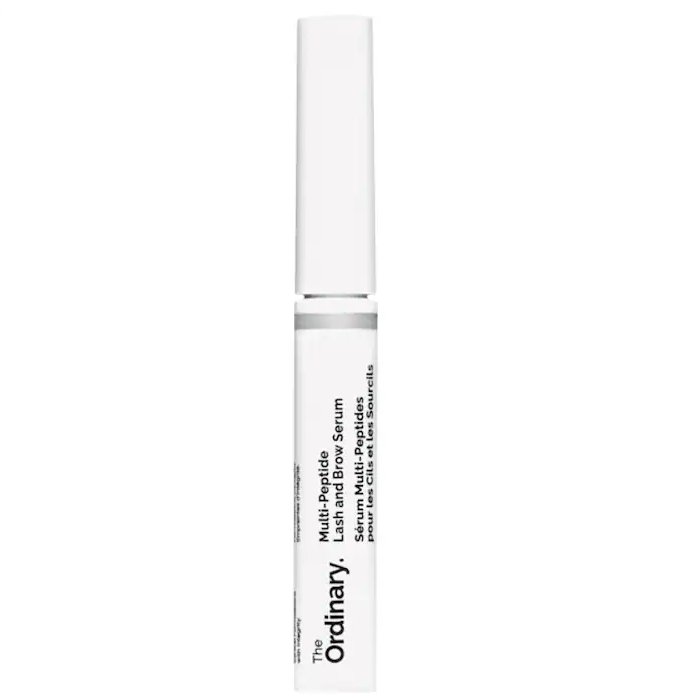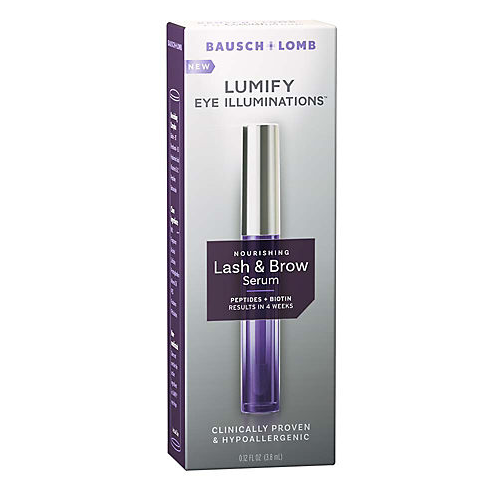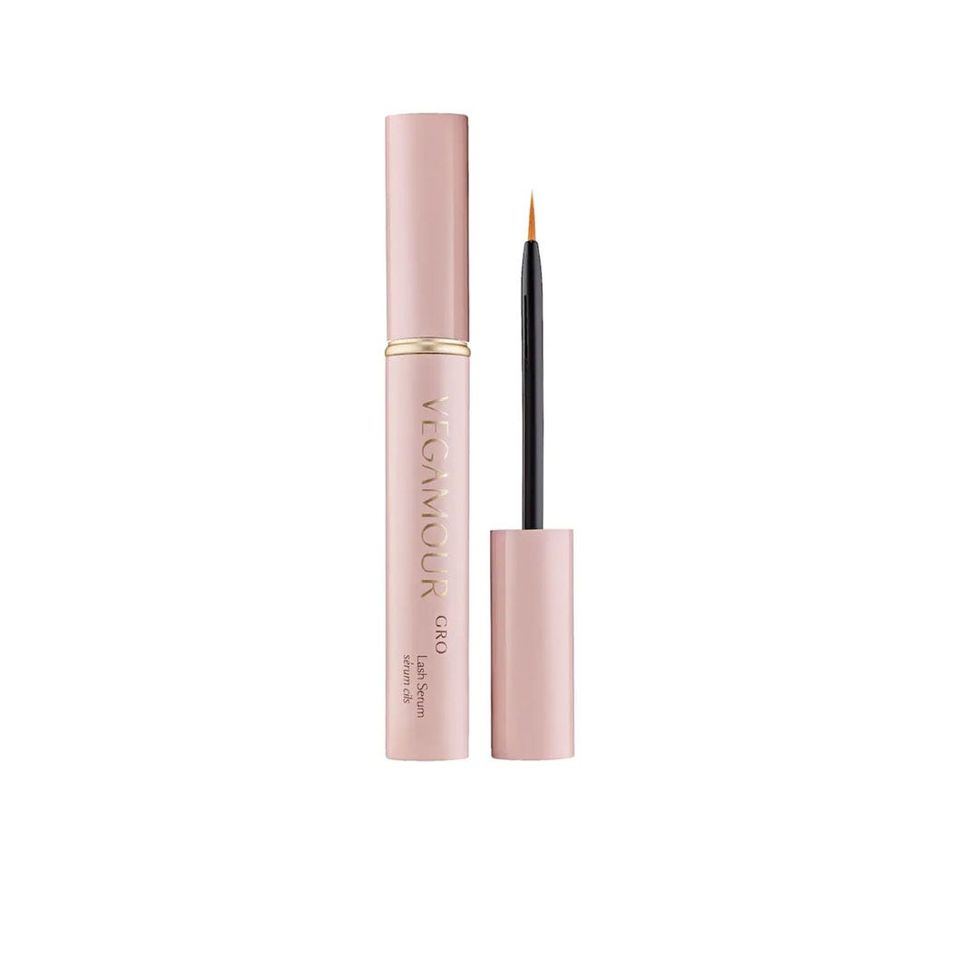Will “Aquaphor Mascara” Make My Eyelashes Grow Longer?
Photo: Edward Berthelot/Getty Images.
Fun fact: The first-ever mascara was invented in the 1830s, made of a mix of coal dust and petroleum jelly. Since then, we've seen all the trends: strip false eyelashes, individual extensions, and prescription and over the counter lash-enhancing serums (which have recently taken some heat for its potential side effects, including changing one’s eye color and causing fat loss around the eye). It could be why we're going back to the basics.
Over the past few years, the most popular "lash-lift trick" on TikTok is, yes, petroleum jelly. The hack involves curling your lashes and applying Aquaphor lip balm in lieu of mascara. Now, with our history lesson, we know that people (mostly women) have been using this trick for hundreds of years, but what is Aquaphor actually doing to the eyelashes? Is it making your lashes grow longer — as some people on TikTok suggest — or is it just making them look longer? When it comes to eyelash health, is petroleum jelly better than mascara? We asked optometrist and eye specialist, Jennifer Tsai, O.D., to weigh in.
AdvertisementADVERTISEMENT
Does Aquaphor make your eyelashes grow?
@cara_loren If you haven’t tried this aquaphor on lash trick yet you must! #aquaphor #aquaphorlove #aquaphorkisses #aquaphorsavestheday #lashtrick #lashhack ♬ original sound - Cara Loren
The short answer is no. "Applying Aquaphor or any other petroleum-based ointment directly to your eyelashes is not a proven method for making them longer or thicker," explains Dr. Tsai. "Aquaphor is typically used as a skin protectant and [ointment] and is not specifically formulated for promoting lash growth. It doesn't contain peptides or bimatoprost," a drug shown to promote lash growth, which we'll get into. If you're using Aquaphor on your eyelashes, it's acting as a kind of eyelash conditioner. "It can help moisturize dry brittle hair," Dr. Tsai explains. But it doesn't impact the growth of the eyelashes.
Which ingredients have clinical evidence to support eyelash growth?
If we're talking about ingredients that verifiably promote lash growth, we're moving into medication territory. Bimatoprost (also known as prostaglandin analogs) is the class of drugs found in prescription eyelash-growth serums, like Latisse, which has been clinically proven to stimulate longer, thicker, and darker lashes. It works. We know because bimatoprost was originally formulated for glaucoma patients, to treat lower intraocular pressure. However, when it was discovered that extreme lash growth was a side effect of using this topical medication, it became commercialized.
Of course, Latisse is a prescription medication for a reason: It can cause side effects — primarily eye irritation — and it's not for everyone. For example, for someone who loses their hair, eyelashes, and eyebrows as a result of chemotherapy, Latisse may be prescribed following the treatment to help promote the regrowth of lashes. But for someone with healthy lashes, looking for extra length and thickness, a prescription medication is probably not the answer. Always talk to your doctor before you decide to go the prescription route.
AdvertisementADVERTISEMENT
Beyond prescriptions, there's biotin. "While not as potent as prescriptions, biotin contributes to healthier lashes and may support growth," offers Dr. Tsai. In a supplement form, biotin could give you visible lash growth. However, it also might not. "From what researchers know about the internal path of ingestible supplements, the body often funnels the nutrients where they are most needed," dermatologist Marnie Nussbaum, M.D. tells Refinery29. "That may be the skin, hair, or nails, but it could also be internal functional organs, which may not show direct physical results." Everyone is different.
Are there natural alternatives for eyelash growth?
There are eyelash-growth serums out there that don't contain bimatoprost or prostaglandin analogs but instead contain ingredients that help condition the lashes you already have while stimulating new growth. Some, like petroleum jelly, are borrowed from skincare, including peptides and panthenol. "Peptides are known to enhance lash follicle health and stimulate growth," explains Dr. Tsai. "Panthenol, or provitamin B5, moisturizes and improves lash condition, making them appear longer and thicker." There's anecdotal evidence that some natural extracts may be effective for lash growth as well. "Botanical extracts like green tea, ginseng, and grape seed nourish follicles, potentially promoting lash growth," says Dr. Tsai.
You'll find peptides and panthenol in The Ordinary Multi-Peptide Lash and Brow Serum (which we tested and loved). Lumify Lash & Brow Serum contains peptides, a topical form of biotin, and hyaluronic acid for lash growth and conditioning. There are natural plant extracts, red clover and mung bean, in the Vegamour GRO Lash Serum.
AdvertisementADVERTISEMENT
If you've used an Aquaphor ointment on your lashes, you may find other oils effective for conditioning. Dr. Tsai notes castor oil, coconut oil, and vitamin E oil can help condition and nourish the lashes. "These help support protection and condition your lashes but there's no proof that they cause hair growth," Dr. Tsai caveats. Like with the petroleum jelly hack, you want to keep these away from your eyeballs and the oil glands around your eyes.
How can I grow my eyelashes?
The easiest way to grow your eyelashes are going to be the most basic: Treat your lashes with TLC so they stay healthy. Dr. Tsai recommends removing all of your mascara before you go to bed. "A lash-friendly removal is a double cleanse for your lashes with oil based cleanser first," says Dr. Tsai. This is important because some mascaras contain alcohol and can dry out your lashes causing them to "break off onto your pillow," Dr. Tsai says. "Speaking of pillows, consider a silk pillowcase or less lash-compromising friction."
While wearing mascara is generally okay for lash health, Dr. Tsai recommends limiting the use of false eyelashes or eyelash extensions. "Adhesives may weaken lashes and cause breakage," Dr. Tsai explains. Like your hair and scalp, your lashes can benefit from dry brushing with a clean, dry spoolie. "Regularly brushing out your eyelashes [helps] distribute natural oils," explains Dr. Tsai.
Finally, Dr. Tsai offers that a diet rich in protein, iron, and biotin will benefit lash health. Of course, talk to your doctor — or optometrist — before trying anything new or off-label. Remember, our eyes are sensitive and sometimes doing less is going to deliver the longest, healthiest results.
At Refinery29, we’re here to help you navigate this overwhelming world of stuff. All of our market picks are independently selected and curated by the editorial team. If you buy something we link to on our site, Refinery29 may earn commission.
AdvertisementADVERTISEMENT









